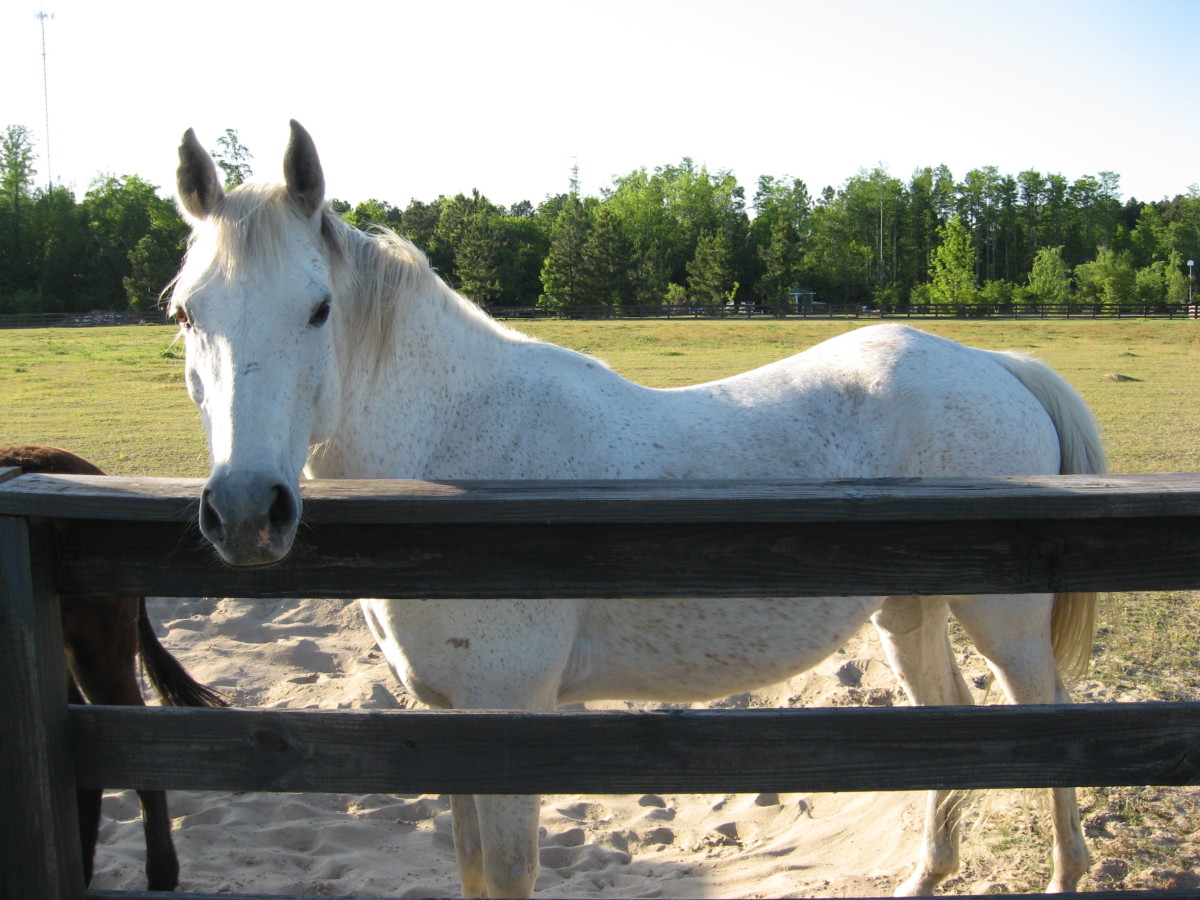Horse Disease Focus - Bleeders

What is a Bleeder?
In most of the world, when we talk about a person or animal bleeding, we mean a cut.
In the horse world, though, a 'bleeder' is something more specific. A bleeder is a horse that gets a nose bleed after intense exercise. Bleeding is most often seen in racehorses, but can also be seen in three day eventers (usually after the cross country phase) and in barrel racers and other rodeo horses. It can occur in any horse if it is taken for a 'good gallop'. It is probable that many riding horses are bleeders, but the condition remains hidden because they are never worked at a speed or intensity to cause symptoms.
Why do some horses 'bleed'?
The cause is uncertain and probably varies from horse to horse. The technical term is 'exercise induced pulmonary hemmorhage' - these horses are bleeding in their lungs.
Bleeding may be hereditary, and it has been associated with unusually high blood pressure in and around the lungs. However, other causes have been put forward, including allergies, problems with the spleen and a sensitivity to physical jarring (which can be particularly noticeable when running on dirt, as many American racehorses do. Barrel racers also run in dirt arenas). What is definitely certain is that only a certain percentage of horses ever experience this condition, which reduces performance and may be painful to the horse.
The frequency and severity tends to increase with age.
Lasix
There is no cure for a bleeder. In the racing industry a drug called lasix has become the standard treatment. However, lasix has also become one of the most highly abused drugs in history. As it gives a small performance boost, it has become the norm for it to be administered to almost all horses. Lasix is also a diuretic and significantly increases the risk of a horse overheating. On top of that, lasix can mask other performance enhancing drugs.
Because of this, lasix bans are being discussed in multiple states, and lasix will not be allowed in the 2012 Breeders' Cup. Lasix is also illegal for use in racehorses throughout most of the world. Many people have an aversion to giving their riding horses lasix, and horses on lasix need to be very well hydrated. However, there is no substitute for lasix if horses are particularly bad bleeders. For this reason, many people in the racehorse industry oppose banning it on horse welfare grounds, whilst horse welfare activists point out that using it encourages the breeding of bad bleeders, which may perpetuate the trait.
Other Treatments
Several treatment options other than lasix are available if your competition horse is a bleeder.
For mild bleeding, some people support the use of nasal dilator strips. As horses cannot breath through their mouth, nasal strips prevent the nostrils from collapsing during exercise. Nasal strips are often used on racehorses, but are banned in some jurisdictions. Scientific studies have mixed results and show that nasal dilator strips may not have any significant effect on bleeding, although they may help a horse's breathing overall and definitely cause no harm.
A drug called seramune, which has been used to boost the immune system in foals, is now being tried for bleeding. It appears to have anti-inflammatory effects and moderates the immune system. It may also help horses recover from lung damage caused by bleeding. However, it is a long-term treatment and takes two to three months to have a significant effect.
Another therapy that has been shown to have some benefit is feeding Omega-3s (which some authorities are now recommending horses be started on several months before they start training). Omega-3s are cheap and have no known negative effects and do not enhance performance, so there is no reason not to put every horse on them.
Amicar is another drug sometimes used to control bleeding, but it has to be administered right before a run, is less effective than lasix and actually has a negative effect on performance.

Prevention
Preventing bleeding is a difficult matter as the causes are variable and not all of them are known.
As severe bleeding appears to be hereditary, avoiding breeding severe bleeders, or being sure to breed them only to horses not known to breed could be helpful in the long term.
Conditioning horses properly before asking them to do intense work definitely reduces the risk of them becoming bleeders. There's also some evidence that waiting until five or older to introduce a horse to intensive exercise actually increases the risk of bleeding.
Environmental management also seems to play a role. Managing barns in a way that minimizes dust is beneficial to all horses and to stable workers. Dampening hay and bedding slightly and storing hay in a separate building both help, as does providing adequate ventilation. (All barn windows should be kept open at all times unless there is a really good reason to close them, such as excessive rain blowing in during a storm, for example).




